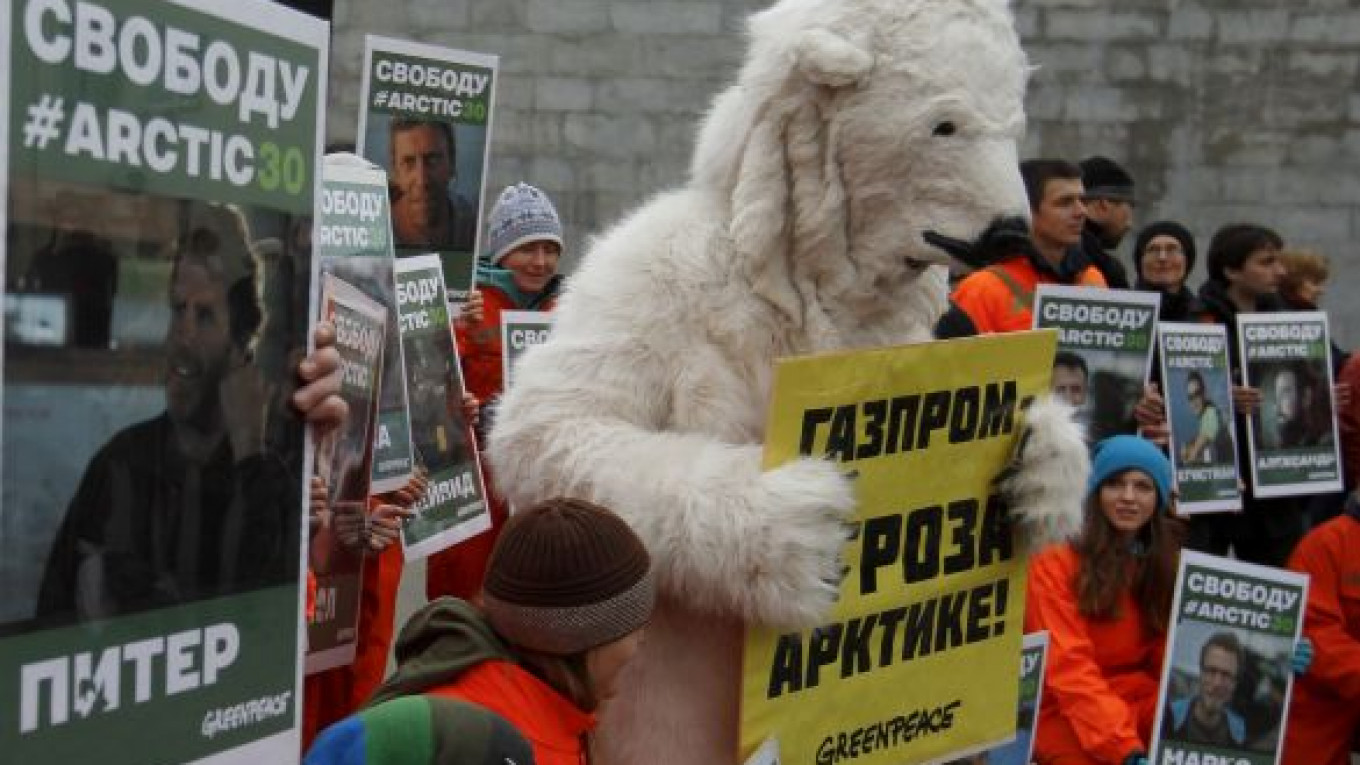Russia shrugged off Dutch legal action over its detention and prosecution of Greenpeace activists for piracy Saturday as protesters took to the streets internationally to call for the 30 detainees, of 18 different nationalities, to be freed.
The Netherlands launched legal proceedings against Russia on Friday, saying it had unlawfully detained activists and others on the Dutch-registered ship last month as it protested against drilling in the Arctic.
Two Dutch citizens were among 30 people on board the Arctic Sunrise, which was seized by Russian authorities near the Prirazlomnaya offshore oil platform.
Deputy Foreign Minister Alexei Meshkov told state-run news agency RIA Novosti that Russia had repeatedly asked the Netherlands to halt what Russia said was "illegal activity" by the ship.
"Unfortunately, this was not done. Therefore, we have far more questions for the Dutch side than they can have for us," Meshkov said, RIA Novosti reported.
"Everything that happened with the Arctic Sunrise was pure provocation."
At a news conference Sunday, head of Rosneft, Igor Sechin, accused Greenpeace of pursuing commercial interests.
"See who is paying them, who is their sponsor," Sechin said, RIA reported.
Russian authorities have pressed piracy charges, which could result in prison sentences of 15 years.
Greenpeace said it was holding up to 100 protests in about 48 countries Saturday to call for the detainees to be freed.
In Russia, protests were held in Moscow, St. Petersburg, Murmansk and Omsk, among other cities, Interfax reported.
In London, up to 700 people demonstrated outside the Russian Embassy with six Britons among those arrested by Russia.
Actor Jude Law, who knows one of the arrested Britons through his children's school, was among the protesters calling for Russia to release the detainees and condemning the charges of piracy as "ludicrous."
"They go into these situatons often expecting arrest and the arrests draw more attention, which is a positive but ... the possibility of a 15-year prison stretch is beyond reason," Law told the BBC.
British Foreign Secretary William Hague has raised the case with Russian Foreign Minister Sergei Ryabkov. Officials said Britain's concerns were based on "consular" issues of welfare.
The Dutch government contests the "unlawful manner" in which the ship was intercepted and is seeking the release of all its passengers, who include 28 activists and two freelance journalists.
Greenpeace said the activists had been engaged in a peaceful protest in international waters to highlight the environmental risks posed by drilling in Arctic waters.
The group says Russian officials boarded its icebreaker and detained activists at gunpoint after the group piloted motorboats toward an exploration vessel working for Russia's top oil producer, the state-controlled Rosneft, and global major ExxonMobil.
Two activists also scaled the side of the Gazprom-owned Prirazlomnaya platform, actions which Russia's Foreign Ministry said threatened security.
As well as the Dutch and British citizens, the group includes four Russians, two Argentines, two Canadians, two New Zealanders, a man with Swedish and U.S. citizenship and one national each from the U.S., Australia, Brazil, Denmark, Finland, France, Italy, Poland, Switzerland, Turkey and Ukraine.
The activists are currently being held in custody in the northern Russian city of Murmansk.
Greenpeace International, based in Amsterdam, denies any wrongdoing and has called the charges absurd. On Friday, Greenpeace Russia accused local news outlets of carrying out a "media attack" on the organization.
Since the Arctic Sunrise ship was seized in international waters two weeks ago, one million people have sent letters to Russian embassies demanding their immediate release, Greenpeace said.
International Executive Director Kumi Naidoo on Saturday described the events in Russia as the most serious assault on the group's environmental activism since the bombing of the organization's flagship, Rainbow Warrior, in 1985.
Material from The Moscow Times is included in this report.
A Message from The Moscow Times:
Dear readers,
We are facing unprecedented challenges. Russia's Prosecutor General's Office has designated The Moscow Times as an "undesirable" organization, criminalizing our work and putting our staff at risk of prosecution. This follows our earlier unjust labeling as a "foreign agent."
These actions are direct attempts to silence independent journalism in Russia. The authorities claim our work "discredits the decisions of the Russian leadership." We see things differently: we strive to provide accurate, unbiased reporting on Russia.
We, the journalists of The Moscow Times, refuse to be silenced. But to continue our work, we need your help.
Your support, no matter how small, makes a world of difference. If you can, please support us monthly starting from just $2. It's quick to set up, and every contribution makes a significant impact.
By supporting The Moscow Times, you're defending open, independent journalism in the face of repression. Thank you for standing with us.
Remind me later.






